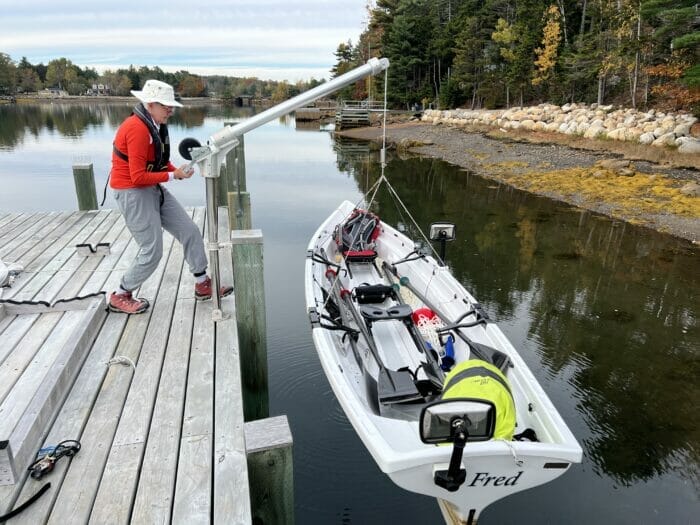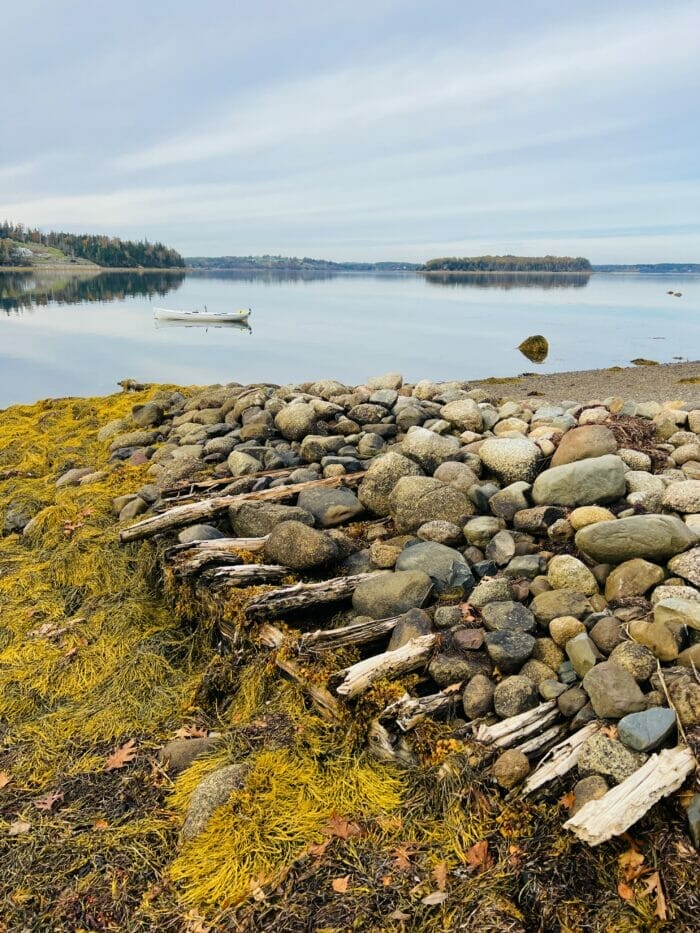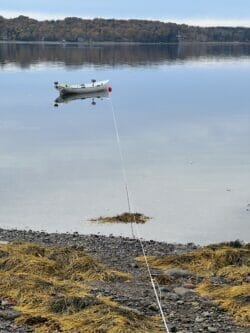
Winter is fast approaching here in Nova Scotia, so we hauled our J/109 a week ago.
We would be kind of bummed, except now we get more time to play with our turbocharged (sliding seats) Whitehall.
Most years we go on rowing until early December and are back at it in March. No worries about storms because she lives lashed down on our wharf.
Loverly attainable adventure today:

- Row to a nearby island
- Walk around the island on the foreshore
- Eat great picnic halfway
- Row home
No chart plotter, no lithium batteries, no tech at all (other than the carbon oars) and easy to maintain…we wash her down once a year whether she needs it or not.
There’s a lot to be said for small simple boats.

We used our version 2.00 dinghy pullout system for the first time today. I will update this article with the improvements.


YES! we also have an 18.5′ Wherry, sliding seat, carbon blades. Rowing is one of the most pleasant activities I can think of. Clears the mind, good excersize if you want it to be. And, gets us out in nature and on the water when the other boats are not possible.
Mitchell
sv Sonata
San Francisco Bay
Looks like fun. I’ve been puzzling over what’s attached to the stern and also the starboard side forward but it finally occurred to me that it must be mirrors. Yes?
Hi John,
Yes, mirrors, very useful.
Hi John,
Those look like very nice boats. For people who haven’t experienced it, the difference between rowing a normal hard dinghy like a Dyer and a whitehall is enormous as is the difference made by a sliding seat. Top crews racing in 8’s will average 12-13 knots for a course that is a little over 1NM but that is a different sort of fun.
Our equivalent is sea kayaks. Around here it is possible to paddle year round although you need to be careful to avoid icing conditions. They are not as good exercise but are slightly more versatile as they maneuver in tight spaces a bit better and can take a bit rougher conditions. The likely downside is that they require more training to be safe in cold weather. I used to think about building a sliding seat wherry or getting an ocean shell but never did. Like you we just finished hauling so as soon as the boat is put away, the kayaks will come out.
Enjoy.
Eric
Hi Eric,
Interesting thinking about sea kayaks and whitehalls. A local couple who are old friends of ours have just bought sea kayaks and so we have been chatting about the relative usage benefits. To me it comes down to a skills and physical agility. The point being that, as you say, it takes a far higher level of both to be safe in a sea kayaks.
Phyllis and I put a lot of thought into this before going with the whitehall because we realized that I, at age 65 (at the time) with a bad back would never master the skills required to be really safe for winter use of a kayak.
The whitehalls we selected are also safer than most of the type in that they are double hulled and self draining, as well as relatively easy to get back into from the water. The result is that we feel pretty safe using the whitehall in relatively open water until the ice comes in, even now at age 71.
The other thing is that the likelyhood of ending up in the water in the whitehall is extremely low, at least the way we use it, so a good way to think about it is:
whitehall = prevention.
sea kayak = you better have the skills to cure.
Hi John,
I completely agree on the relative safety profiles. There is no denying that a sea kayak can quickly end up upside down which for most people results in swimming (hopefully not getting stuck in the boat but this does happen, especially with certain skirts) and then a hard time getting back in the boat. This risk is manageable for intermediate paddlers if you stay in protected waters, wear a drysuit and have done a lot of practice wet exiting and getting back in the boat. Getting back in the boat is harder than many think until you have practiced it a lot and I think you need to be prepared to do it with everyone out of their boats at once. Like many things, there are tons of pieces of gear available to help you and I think the best techniques actually involve no specialized gear at all once you learn them.
That said, a good paddler can paddle in frighteningly rough conditions, which would be extremely dangerous in an open rowing craft and quite unpleasant in a cruising sailboat. One of the things that I look back on with horror which I used to do when I was younger was to take a sea kayak out to play in nor’easter waves off Gloucester ducking in and out of the lee as you couldn’t make significant forward progress. We encountered significant wave heights up to about 15′ with lots of breakers on multiple occasions. The key here was that the group of us who used to do this were all serious whitewater paddlers, most people who sea kayak do not have a good way to get the experience to handle these sorts of conditions. As one example, a lot of people can roll a kayak but most will immediately panic and swim if flipped in real conditions. Unfortunately, whitewater is actually quite a dangerous sport so telling people they will be safer sea kayakers if they take up whitewater is not a good trade-off. I do encourage people to go to whitewater surf waves as you can learn a lot of the whitewater stuff with not much risk. In whitewater and rough sea kayaking, I was always aware that an injury like a thrown out back would very quickly put me in trouble.
If I were in your shoes, I would probably get the whitehall too. My wife and I actually met whitewater kayaking and as we thought about getting our first cruising boat, one thing that we both felt was that whitewater and aggressive sea kayaking were sports for younger people and we would not be able to do them forever.
Eric
Hi Eric,
That makes a lot of sense. Bottom line interpretation, from your comment: if you are going to sea kayak you need way more, and more difficult to learn, skills than we need for the whitehall, but if you are really good and experienced you can manage extreme conditions, although the intrinsic dangers are quite high. Sounds to me like you made a good call to ease up, even at a relatively young age.
Another point is that I have been rowing small boats since childhood, so what seems easy and safe to me in a whitehall might not feel, or even be, safe for someone new to rowing and being in choppy water in a small boat.
Hi John and Eric,
As a long-time paddler I find this to be an interesting discussion. In the last few years I’ve transitioned from sit-inside kayaks to sit-on tops, mainly because there is less gar involved, but also because I can no longer snap well enough for a reliable roll. Wet-exit-and-roll works, but I don’t enjoy it. Belly-bottom-feet recovery with a sit-on-top is much easier. I’ve often admired Whitehalls and would get one if I had the means to store and transport it easily. Here’s a good description of the precautions one should practice when paddling any small boat in cold water, a lot of it echoing the above posts: https://theensign.org/cold-water-paddling/
Steve
And that is why I love my kayaks! No maintanance, as easy as stepping out the door and going for a walk. Add a drysuit, and I often paddle with ice on the water. With good gloves and a spray skirt I’m just as toasty as I would be inside.
A roll is something to learn, and wide recreational kayaks won’t roll (but they are very hard to tip). On the other hand, they are not too hard to reboard. And I once spent 6 hours in 32F water in a drysuit just to prove a point. My body temperature had actually risen. I’m more at easy crossing rough, open water in a kayak than most dinghies. But yes, it takes some practice, like skis or ice skates.